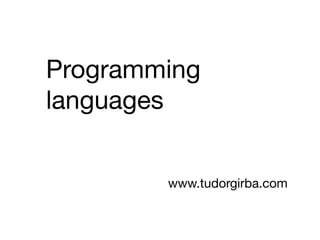
Programming languages overview
- 1. Programming languages www.tudorgirba.com
- 2. computation information information computer
- 3. A language is a set of sequences of symbols that we interpret to attribute meaning.
- 4. ambiguous All elements of an array a of length N are either zero or one (1) ∀i: 0≤i<N: ( ai=0 ∨ ai=1 ) (2) (∀i: 0≤i<N: ai=0) ∨ (∀i: 0≤i<N: ai=1) Example
- 5. A programming language is a a language for communicating software designs.
- 11. # Compute factorials def fact(n) if n == 0 1 else n * fact(n-1) end end puts fact(ARGV[0].to_i)
- 12. # Compute factorials def fact(n) if n == 0 1 else n * fact(n-1) end end statements puts fact(ARGV[0].to_i)
- 13. # Compute factorials def fact(n) if n == 0 1 else n * fact(n-1) expression end end statements puts fact(ARGV[0].to_i)
- 14. # Compute factorials variables def fact(n) if n == 0 1 else n * fact(n-1) expression end end statements puts fact(ARGV[0].to_i)
- 15. # Compute factorials variables def fact(n) if n == 0 literals 1 else n * fact(n-1) expression end end statements puts fact(ARGV[0].to_i)
- 16. # Compute factorials variables def fact(n) if n == 0 literals 1 else control n * fact(n-1) expression constructs end end statements puts fact(ARGV[0].to_i)
- 17. functions # Compute factorials variables def fact(n) if n == 0 literals 1 else control n * fact(n-1) expression constructs end end statements puts fact(ARGV[0].to_i)
- 18. comments functions # Compute factorials variables def fact(n) if n == 0 literals 1 else control n * fact(n-1) expression constructs end end statements puts fact(ARGV[0].to_i)
- 19. in g, 1937 Alan Tur
- 20. Smalltalk = = Java
- 25. Imperative data + algorithms Object-oriented objects + messages
- 26. Imperative Functional data + algorithms stateless + pure functions Object-oriented objects + messages
- 27. Imperative Functional data + algorithms stateless + pure functions Object-oriented Logic objects + messages facts + rules
- 30. Church’s Lambda Calculus 1932 (λ x. (λ y. x)) a b (λ y. a) b a
- 33. Subroutine 1949
- 35. Fortran 1955 C AREA OF A TRIANGLE - HERON'S FORMULA C INPUT - CARD READER UNIT 5, INTEGER INPUT C OUTPUT - LINE PRINTER UNIT 6, REAL OUTPUT C INPUT ERROR DISPAY ERROR OUTPUT CODE 1 IN JOB CONTROL LISTING INTEGER A,B,C READ(5,501) A,B,C 501 FORMAT(3I5) IF(A.EQ.0 .OR. B.EQ.0 .OR. C.EQ.0) STOP 1 S = (A + B + C) / 2.0 AREA = SQRT( S * (S - A) * (S - B) * (S - C)) WRITE(6,601) A,B,C,AREA 601 FORMAT(4H A= ,I5,5H B= ,I5,5H C= ,I5,8H AREA= ,F10.2,12HSQUARE UNITS) STOP END
- 36. ALGOL 1958 begin ... end <statement> ::= <unconditional statement> | <conditional statement> | <for statement> ... f() ... f()
- 37. Lisp 1958 (defun factorial (n) (if (= n 1) 1 (* n (factorial (- n 1))))) Garbage collection Programs = Data
- 38. COBOL 1959 ADD YEARS TO AGE. MULTIPLY PRICE BY QUANTITY GIVING COST. SUBTRACT DISCOUNT FROM COST GIVING FINAL-COST. Modules
- 39. Basic 1964 10 INPUT "What is your name: ", U$ 20 PRINT "Hello "; U$ 30 INPUT "How many stars do you want: ", N 40 S$ = "" 50 FOR I = 1 TO N 60 S$ = S$ + "*" 70 NEXT I 80 PRINT S$ 90 INPUT "Do you want more stars? ", A$ 100 IF LEN(A$) = 0 THEN GOTO 90 110 A$ = LEFT$(A$, 1) 120 IF A$ = "Y" OR A$ = "y" THEN GOTO 30 130 PRINT "Goodbye "; U$ 140 END
- 40. JCL 1964 //IS198CPY JOB (IS198T30500),'COPY JOB',CLASS=L,MSGCLASS=X //COPY01 EXEC PGM=IEBGENER //SYSPRINT DD SYSOUT=* //SYSUT1 DD DSN=OLDFILE,DISP=SHR //SYSUT2 DD DSN=NEWFILE, // DISP=(NEW,CATLG,DELETE), // SPACE=(CYL,(40,5),RLSE), // DCB=(LRECL=115,BLKSIZE=1150) //SYSIN DD DUMMY
- 41. Semaphores 1965 P1 — acquire resource X … critical section V1 — release resource X P2 — acquire resource X … critical section V2 — release resource X
- 42. Planner Prolog 1969 1972 man(socrates). mortal(X) :- man(X).
- 43. Planner Prolog 1969 1972 man(socrates). mortal(X) :- man(X). ?- mortal(socrates). Yes
- 44. Planner Prolog 1969 1972 man(socrates). mortal(X) :- man(X). ?- mortal(socrates). Yes ?- mortal(elvis). No
- 45. Pascal 1970 function gcd (a, b: integer) : result real; var x : integer; begin if b= 0 then gcd := a else begin x := a; while (x >= b) do begin x := x - b end; gcd := gcd(b,x) end end
- 46. C 1972 #include <stdio.h> //echo the command line arguments int main (int argc, char* argv[]) { int i; for (i=1; i<argc; i++) { printf("%s ", argv[i]); } printf("n"); return 0; }
- 47. Smalltalk 1972 Integer»factorial self = 0 ifTrue: [^ 1]. self > 0 ifTrue: [^ self * (self - 1) factorial]. self error: 'Not valid for negative integers' 5 factorial -> 120 Everything is an Object Everything happens by sending messages
- 48. Monitors 1974 public class Account { protected int assets = 0; ... public synchronized void withdraw(int amount) { while (amount > assets) { try { wait(); } catch(InterruptedException e) { } } assets -= amount; } ... }
- 49. Bourne shell 1977 cat Notes.txt | tr -c '[:alpha:]' '012' | sed '/^$/d’ | sort | uniq –c | sort –rn | head -5
- 50. SQL 1978 SELECT * FROM Book WHERE price > 100.00 ORDER BY title;
- 51. Perl CGI 1978 1993 #!/usr/bin/perl -w print "Content-type: text/htmlnn"; print <<'eof' <html><head><title>Directory contents</title></head> <body> <h1>Directory contents</h1><ul> eof ; @files = <*>; foreach $file (@files) { print '<li><a href="' . $file . '">' . $file . "</li>n"; } print "</ul></body></html>n"; __END__
- 52. JavaScript Ajax 1995 2005
- 55. Tudor Gîrba www.tudorgirba.com creativecommons.org/licenses/by/3.0/
